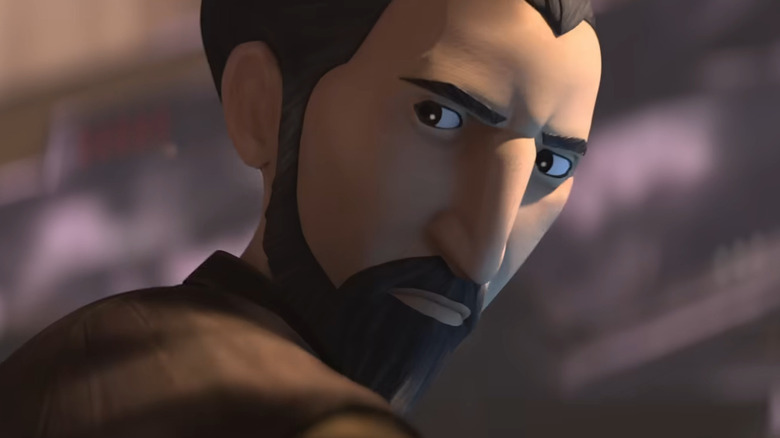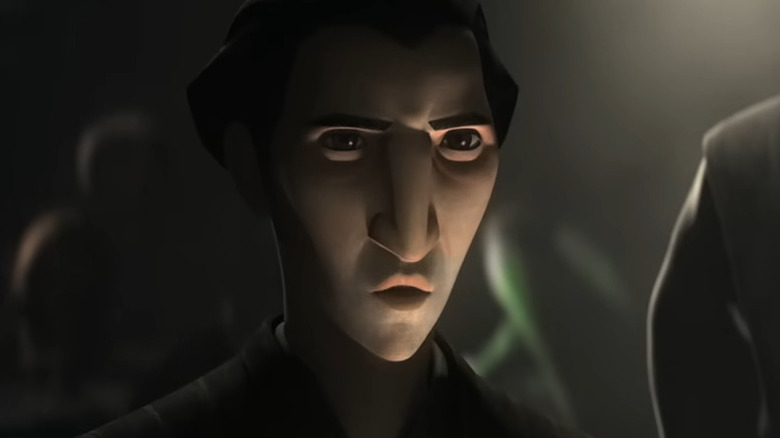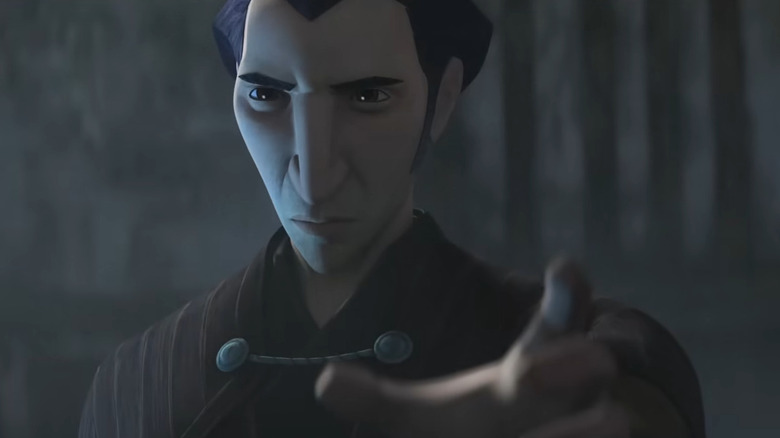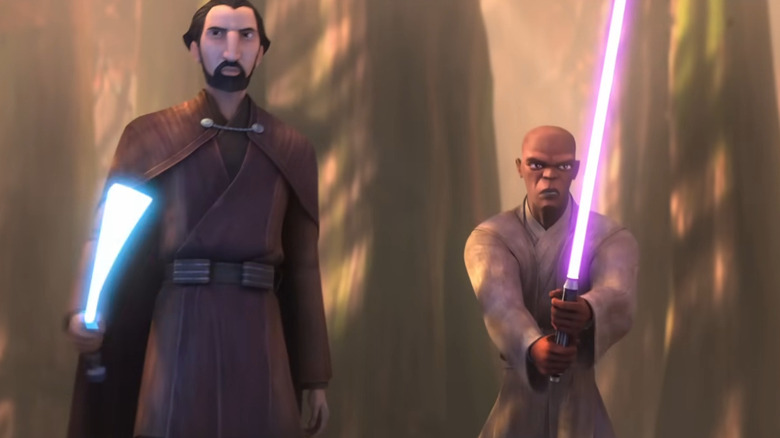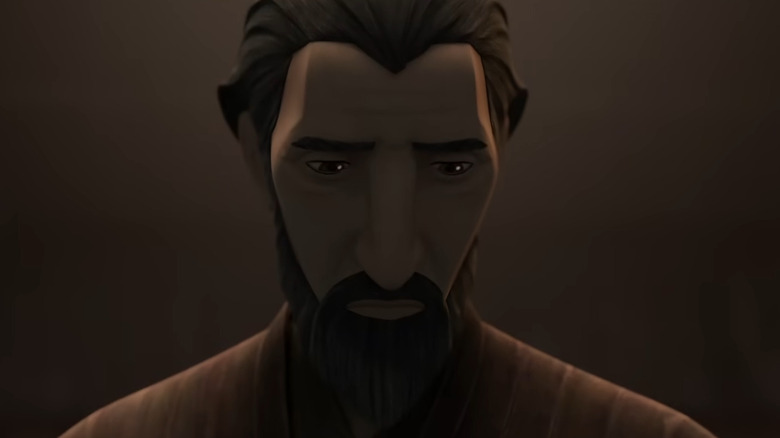Corey Burton Descends To The Dark Side To Discuss Count Dooku In Tales Of The Jedi - Exclusive Interview
In the mythology of "Star Wars," a large portion of focus goes toward young Anakin Skywalker's descent into the Dark Side. He began his life as a slave on Tatooine, only to find himself designated the Chosen One among the Jedi Council. It was here he began to train under the tutelage of Obi-Wan Kenobi, with his sights set on becoming a Jedi Master.
Unfortunately, due to Anakin's own hubris and his anger toward the Council for not making him a Jedi Master, he fell into the Dark Side. It wasn't even the first time such an incident happened, as the "Star Wars" prequel trilogy introduces viewers to Count Dooku. He also began his training as a student of the Light Side, only to find himself corrupted.
He may not have a ton of screen time in the prequel trilogy, but he's further fleshed out in the newest "Star Wars" series to debut on Disney+ — "Tales of the Jedi." Voiced by Corey Burton, audiences will get a larger glimpse into the psyche of Count Dooku and understand why he chose the path he went down. Plus, Looper chatted exclusively with Burton to discuss all things related to Dooku, including how he's connected with another fan-favorite "Star Wars" character: Ahsoka Tano.
On returning to Count Dooku after The Clone Wars
What was it like stepping back into the role of Count Dooku?
It was terrific, as I expected. It's a character I have been playing for so many years. It feels natural to me. I was really excited to get the opportunity to play more of his whole being, him as a younger, emerging, powerful, menacing, and grand and glorious character. What would he have been like as a youth? [I explore] what would've been a more optimistic and more lighthearted character, as opposed to just the dark and heavy.
How does the voice acting process differ with Count Dooku who originated in movies — you had some blueprints there — versus someone like Cad Bane, who was an original creation for the "Clone Wars" series?
As with most sound-alike characters, where we're taking on a role that was originated by another actor, it begins with mimicking the original performer and their performance. Once you've got the sound and the personality established, then your job is to forget about all of that and play the character as you feel it, and it's naturally going to sound right.
We always keep one ear open for the director and the all-important dialogue that comes from the mind, the imagination of the writer. When I see the lines in a script, I hear the character's voice in the words. Then, it's my job to inhabit that or to let those words inhabit my vocal sound or whatever. It's like a mind-meld process, I suppose, where you try to feel and hear what is in the writer's mind, as translated and embellished by the director, and bring that to the microphone.
The tragedy of Count Dooku
What do you think makes Dooku such a relatable character to where he's been around for 20 some years at this point and continues to resonate with audiences?
He's a very Shakespearean character. He's the tragic, vainglorious villain. He's a politician. He's duplicitous. He has a grand scheme, bringing order to the galaxy. Yet as with any great villain, they don't think of themselves as a villain, and there's a certain note of tragedy in their existence.
"I'm doing this for the good of the galaxy. Never mind all of the pain and suffering that you and your loved ones are going through ... It'll all work out in the end!"
"Tales of the Jedi" follows both Ahsoka Tano and Count Dooku. What do you think makes those two characters so complementary toward one another?
They're both masters of their own realm. They're both very powerful individual personalities. [With] Ahsoka, her strength is more of a surprise because the image she projects is of a clever, charming, pixie-like street kid who can, like ..."Oh, yeah? Watch this! I can blow up a planet too," while still being very endearing and approachable.
Whereas Count Dooku is vainglorious. He's intimidating, he's austere, he's formal, and there's a sense of darkness about him in his mature stage of life.
The dynamic between Dooku and Qui-Gon Jinn
How do you view the relationship between Dooku and Qui-Gon Jinn?
They're contemporaries, as they say. They grew up in the same club. They're "went to high school together" kind of characters, so there would always be a rivalry, a bit of jealousy between them, I would imagine, yet a certain subtle underlying sense of camaraderie, in that we were classmates together. That's on a more emotional level rather than following anything in particular to the story.
Did you have a chance to work with Liam Neeson at all, as he's come back to voice Qui-Gon for the series?
Not directly, no. I was able to hear some of his recorded lines, but we don't generally work with all of our cast members anyway. This is during the pandemic, so we all work remotely now. Even when we do record together, if you're working with a famous actor or any other multi-voice actor, I'm not relating to the actors as fellow actors while we're recording. I'm hearing and seeing in my mind's eye the scene and the characters they're playing. It wouldn't work in my mind if I was imagining or thinking of and looking at James Arnold Taylor when he's playing Obi-Wan Kenobi. I have to feel my character, coming through me, is in a scene with his character.
James and I will chat as old friends in between scenes and in the lobby or whatever, but when we are in the scenes, we are our characters. We are channeling them, so to speak. As I always say, as a voice actor, the character is the star. It's not like you're working with a bunch of celebrities and it's like, "Wow, I'm working with whoever," with Harrison Ford or somebody. It's more like I'm Sean Connery's character working with Indiana Jones ... or not working, but existing with him in this fantasy world.
Very often, good character actors are nothing like the characters that you see and experience on screen. It's all in the world of illusion in the mind's eye or the mind's ear. It's how I approach all my work. The scene is all there in my imagination.
You lose yourself in that. You don't think about yourself at all. You're not thinking, "How would I say this?" You're not even thinking, "How would the character say it?" You just embody the character and let the character say their lines. Let the character be the character, leap off the page and onto the screen. You're there directing the flow of traffic, in a way.
On the lineage of Jedi
In "Star Wars," there's a lineage of Jedi that goes from Yoda to Dooku, to Qui-Gon, to Obi-Wan, to Anakin, and to Ahsoka. Do you think there's a little bit of Dooku in Ahsoka that she may have inherited from the teachings of Obi-Wan and subsequently Anakin?
I would think so. It's the cohesive soul of the Jedi that is within all of them. It all relates to the Force and it's a part of all of them, and they are that special corner of, or a portion of, the Force that is that Jedi energy that the rebels ... the spirit of youthful ... Well, dealing with the darker characters, it's not youthful, but they had it once. They are charged with doing something to make a difference in their universe and their world. They're the leader types. You are imbued with the power to change things. They're all loyal to their instinct, to their drive to do something significant and to be a leader of the other characters to make a difference in their world.
Were there any changes you had to make to voicing Cad Bane in animation versus voicing him in live-action with "The Book of Boba Fett"?
Sure. It's a different art form. Animation is surrealistic. It was Walt Disney that called it the "illusion of life." For live-action, it's a cinematic illusion where you are seeing more real human beings as characters, and it's a different style of performance. It's more intimate in a way, whereas in animation, it's a heightened reality; it's exaggerated. Facial movements and expressions are more painted bigger than life. When you take that down to life-size, it becomes a more human thing, even though Cad Bane is not a human creation.
Cad Bane in animation is going to be very intense on everything. [Performing as Cad Bane] "Todo! I thought I told you not to do that! Not in front of the little lady." Whereas in a more cinematic thing [imitating Cad Bane again], "I told you not to do that in front of the little lady." It becomes a more breathed kind of performance. It's smaller than life in a way, but it's a macro. It's an amplified, quiet, subtle performance. There's nuance that you don't do necessarily in an animated performance.
In live-action, Cad is 50 years older, and that's quite a stretch. He's been away from his home planet, with his own species, for 50 years, so he's changed. He becomes more human. He's adopted more of the dialect and attitude of the characters around him on the world of Mos Eisley, that gritty, dusty, hot place. As Robert Rodriguez and Dave [Filoni] kept pointing out, he's tired, he's battle-worn, he's all beaten up, and he's there to settle a score.
It was quite different in a way. Also, it's a team effort. I'm working with Dorian Kingi. We did not work directly together, but we both are the character. I was blown away by his physical representation of that animated character. It was perfect and melded so beautifully with the voice. Then you had the animation team puppeteers and animatronics people doing the face, and it all worked to create a very real Cad Bane. You could feel that character.
"Tales of the Jedi" is now available on Disney+.
This interview was edited for clarity.
